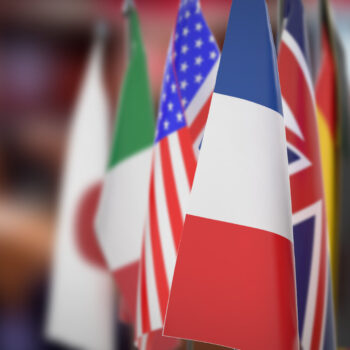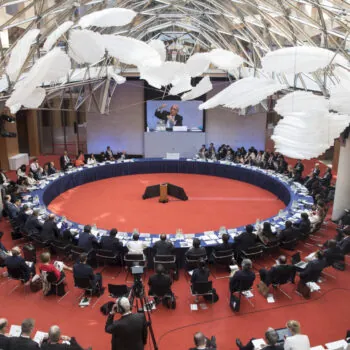Overheard in Paris: “I’m a bit caught up with a very complex ratchet mechanism. While this sounds unfortunately like an instrument of torture, the inclusion of an ‘ambition mechanism’ to progressively ‘ratchet up’ national targets has become a core test of the strength of the Paris Agreement. But through the somewhat-tortuous process of translating political will into legal text, will it fall foul of the guillotine as ministers and negotiators chop down the text in Paris this week?"
On the opening day of COP21, leaders from across the world expressed strong support for an ‘enduring and dynamic regime’. This speaks to Paris not being a one-off deal, but instead setting up regular moments where all countries can come together and collectively step up their national targets. However, as we moved into technical negotiations last week, negotiators spliced the elements of a strong ambition mechanism across multiple parts of the draft text – leaving key parts lost in translation. But Paris should be judged on the impacts it can have on the world. To do this, clarity is key.
The revolution will be organised
The ratchet is actually much simpler than it sounds: as countries’ current offers on the table are not ambitious enough to prevent dangerous climate change, Paris needs to set a clear process of how we can bridge that gap without delay. In other words, the exciting, disruptive low-carbon transition must be underpinned by a fair and achievable plan of how to get to our destination. And, at the risk of mixing engineering metaphors, why reinvent the wheel when designing the ratchet? The model of a 2050 decarbonisation goal with regularly updated targets for the short-term is being adopted in climate legislation worldwide – and is driving emissions reductions on the ground. What we’re looking for in Paris therefore, is for the Agreement to make this a coordinated global process that can motivate countries to step forward, further and faster. In summary: we need political moment every 5 years where countries come together with higher targets, and we need to have the first moment in the calendar now.
Solidarity in action
The most climate vulnerable nations set an important tone last week, emphasising what climate change really means for communities. The Climate Vulnerables Forum issued a powerful moral call for the world to recognise that climate change threatens the survival of their populations – and for certain low-lying islands, their very existence. Building on a UN scientific review that showed the political obligation to limit temperature rise to 2°C will expose communities to severe and dangerous impacts, these nations rallied support from France and Germany among others for the Agreement to recognise 1.5°C is the temperature limit they need to protect their citizens.
However, without a plan to accelerate the global transition away from fossil fuels, these expressions of solidarity will fail to deliver solidarity in practice. We need action, not just words. Analysis from the UN and independent experts have shown us current INDCs will not get us on track to less than 2°C of warming, let alone 1.5°C. As time passes, the increasing risk of high carbon lock-in threatens our ability to manage temperature rise at all. Ensuring countries will have to conduct domestic discussions on increasing ambition globally without delay (certainly before 2020 when their proposed targets come into effect) is therefore the benchmark of whether the Paris Agreement can uphold governments' responsibilities to citizens and to global solidarity.
Bringing Paris home
Additionally, as Paris sends those of us working on it slightly round the bend, we can lose track of why we as campaigners need international agreements. But having the ‘hook’ of an international moment can boost our work as campaigners across the world to speed up decarbonisation in our own local and national settings.
The process of countries preparing their INDCs, or national plans, in the run-up to Paris has ensured that an unprecedented number of countries now have strategies to limit their emissions. A strong outcome in Paris should empower countries to build on this by developing long term decarbonisation strategies and short-term plans to manage their own emissions, as well as provide regular moments for this to be evaluated globally. But of course, governments are always helped along with a bit of pressure. While there’s been a lot to do up to Paris, the work for campaigners won’t stop next week – and getting a strong ratchet in the agreement can provide greater agency for national and local campaigns in years to come.
As we saw, having Paris on the horizon, with an internationally-agreed process for countries to prepare national plans, gave us the angle of international credibility when trying to open up more space in Europe’s 2030 climate and energy package. The Paris moment helped my colleagues around the world push their governments to create, some for the first time, climate strategies. Ensuring the next collective ‘show and tell’ for countries’ commitments is in the diary, and in sight, means when we get home from Paris, our governments can’t get away with saying “job done” and relegating climate to a low priority. Paris can’t give us a safe climate in one fell swoop, but it can give us an internationally-recognised agreement for us to hold our politicians accountable to. Ensuring this can’t be left to gather dust, but compels governments to return to the spotlight every five years gives us another tool for the whole range of tough fights we’re in – whether that’s securing coal phase-out decisions, stopping high-carbon infrastructure projects or putting a further squeeze on the social licence of the fossil fuel industry.
The rhythm of five-yearly international moments can stoke a much more sustained domestic conversation, and provide the impetus for governments to revisit and up their targets, based on real-world changes that are making the political risks of climate action lower by the day – through falling costs of clean energy technology, the stigmatisation of coal, or the tragic realities of climate impacts.
So while it’s a horrible word and a well-organised process may not sound ground-breaking, ensuring a clear ‘ratchet’ lives in the Paris Agreement can do a lot for making action easier in the real world. So vive le ratchet – for all the work we have to do after Paris to protect communities worldwide at risk from dangerous climate change.


